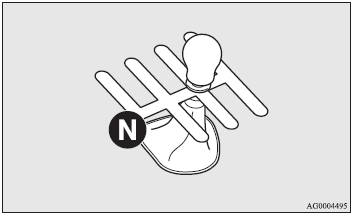 Mitsubishi Outlander: Starting the engine
Mitsubishi Outlander: Starting the engine
[For vehicles equipped with the keyless operation system]. For information on operations for vehicles equipped with the keyless operation system, refer to ŌĆ£Keyless operation system: StartingŌĆØ on page 1-23, 1-30. [Except for vehicles equipped with the keyless operation system].
Tips for starting
Do not operate the starter motor continuously longer than 10 seconds; doing so could run down the battery. If the engine does not start, turn the ignition switch back to ŌĆ£LOCKŌĆØ, wait a few seconds, and then try again. Trying repeatedly with the starter motor still turning will damage the starter mechanism.
WARNING:
● Never run the engine in a closed or poorly ventilated area any longer than is
needed to move your vehicle in or out of the area. Carbon monoxide gases are odourless
and can be fatal.
CAUTION:
● Never attempt to start the engine by pushing or pulling the vehicle.
● Do not run the engine at high rpm or drive the vehicle at high speed until the
engine has had a change to warm up.
● Release the ignition key as soon as the engine starts to avoid damaging the starter
motor.
● Do not stop the engine immediately after high-speed or uphill driving. First allow
the engine to idle to give the turbocharger a chance to cool down.
Starting the engine
1. Insert the ignition key and fasten the seat belt. 2. Apply the parking brake. 3. Depress and hold the brake pedal. 4. Depress the clutch pedal all the way and place the gearshift lever in the ŌĆ£NŌĆØ (Neutral) position.

5. Turn the ignition key to the ŌĆ£ONŌĆØ position. The diesel preheat indicator lamp will first illuminate, and then after a short time go out, indicating that preheating is completed.
NOTE:
● If the engine is cold, the diesel preheat indicator lamp is on for a longer time.
● When the engine has not been started within about 5 seconds after the diesel preheat
indicator lamp went out, return the ignition key to the ŌĆ£LOCKŌĆØ position. Then, turn
the key to the ŌĆ£ONŌĆØ position to preheat the engine again.
● When the engine is warm, the diesel preheat indicator lamp does not come on even
if the ignition key is placed in the ŌĆ£ONŌĆØ position. Start the engine by turning
the ignition key right to the ŌĆ£STARTŌĆØ position. 6. Turn the ignition key to the
ŌĆ£STARTŌĆØ position without depressing the accelerator pedal, and release it when the
engine starts.
NOTE:
● A ticking noise may be heard after starting the engine. This is not an abnormal
condition. The noise will disappear after a short time of engine running. If the
ticking noise continues after the engine is warmed up, we recommend you to have
your vehicle checked.
Fuel injection amount learning process
To keep exhaust emissions and engine noise low, the engine very occasionally performs a learning process for the fuel injection amount. The engine sounds slightly different from usual while the learning process is taking place. The change in the engine sound does not indicate a fault.
 Steering wheel lock
Steering wheel lock
[For vehicles equipped with the keyless operation system]. For information on
operations for vehicles equipped with the keyless operation system, refer to ŌĆ£Keyless
operation system: Steering whe ...
 Manual transmission
Manual transmission
The shift pattern is shown on the gearshift lever knob. Be sure to always fully
depress the clutch pedal before attempting to shift the lever.
CAUTION:
● Do not put the gearshift lever in ...
See also:
LATCH lower anchor location
LATCH lower anchor location
The LATCH anchors are located at the rear of
the seat cushion near the seatback. A label is
attached to the seatback to help you locate the
LATCH anchors. ...
System Activation
Sirius Satellite Radio service is pre-activated, and you
may begin listening immediately to the one year of audio
service that is included with the factory-installed satellite
radio system in yo ...
Key Lock Release
Vehicles with an automatic transmission are equipped with an electronic key lock
release system.
The key lock release is designed to prevent ignition key removal unless the shift
lever is in P ...
